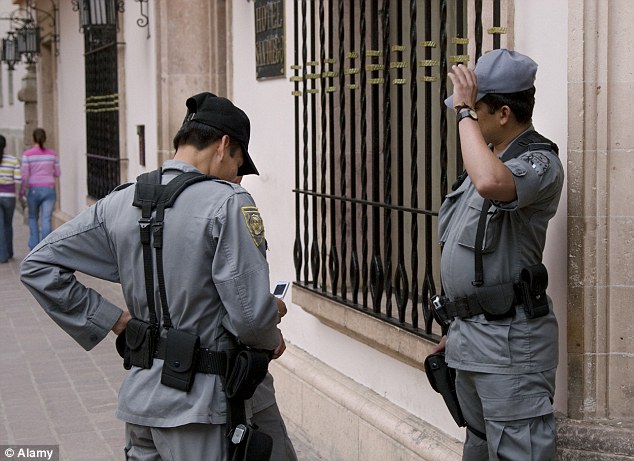From fake hotel wake up calls to the airport security trick to steal your valuables: The top 10 travel scams revealed (and how you can avoid them)
- Peter John, author of Around the World in 80 Scams, explains top cons
- From worthless gemstones to phony take away menus and corrupt cops
- Scammers offer refundable airline tickets on gumtree.com
Travelling has never been easier or more popular. And like moths to a flame, scammers are drawn to people who are on holiday or 'just passing through' with money to burn, no local knowledge and all their valuables tucked neatly nearby.
Every year foreign visitors are tricked out of small change or, worse, find themselves in dangerous situations or the victims of crime.
While this is by no means a warning against travel, being prepared and on guard can go a long way to evading confidence tricksters, wily locals and credit card bandits.
Scroll down for video

Scammers are drawn to holiday goers and travellers but if you know what to look out for you can avoid cons
Together with Peter John, author of Around the World in 80 Scams: An Essential Travel Guide, we run down some of the most well-worn ruses, and how to dodge them.
1.) Fake wake up call
Cheapflights.co.uk commissioned research into the most popular travel scams and found that hotel guests are often duped by fake wake up calls.
Late at night the phone rings with someone claiming to be from the front desk.
They explain that the internal computer system has crashed and that they need your credit card information again. In fact, they are a prisoner speaking to you on a smuggled mobile phone.
In your sleep addled state you give them everything they need to empty your bank account. This scam was especially common in Georgia, in the US.
Avoid it by: Refusing to give any information and putting down the phone. Tell hotel staff and the police immediately.
2.) Airline ticket refund ruse
Beware cheap tickets and refundable schemes.
'Scammers advertise refundable airline tickets free on sites like gumtree.com,' says Peter John.
'They sell them for cash (to you) and then get the money they paid for the tickets refunded to their credit cards.'
You wind up with no ticket and an airfare down; the scammer has your money as well as the cash they originally paid for the ticket refunded.
Avoid it by: Buying tickets direct from airlines or first-hand through trusted websites.
3.) Phony takeaway menu
No matter how hungry you are or late it is watch out for fake menus. After you've settled into your hotel room a takeaway menu might be surreptitiously slipped under your door.
If you order from it there's a strong chance you won't see any food but the person on the other end of the phone now has your card details and will be making a large withdrawal.
Avoid it by: Eating in local restaurants or ordering room service.

Tricksters put fake take away menus under hotel doors to collect your money without delivering food

Fake wake up calls are made by scammers from prisons to hotel rooms in a bid to extract your bank details
4.) Gemstone scam
A simple but effective trick: a scammer sells a tourist some gems cheaply, telling them they can make a fortune by selling them back at home or making them into a pair of earrings or a bracelet. The gems turn out to be worthless paste.
'This is especially common in south east Asia and India,' says Peter John.
'Several Malaysians complain each year about gem scams in Thailand. In 2009, a Malaysian man and his family were taken to a Thai gem shop where the manager claimed that it was the last day of a sale.

Con artists sell gems cheaply so you can make a fortune reselling them, if they didn't turn out to be worthless
'The manager said that normally the shop would not sell to tourists as it was a wholesale business. The business had an 'ISO 9001' banner outside, which convinced the victims to buy gems.
'They bought two pendants, a ring and a pair of ear-rings for 130,000 Baht ($4,000/£2,500). When they returned to Malaysia and had the gems inspected, they found out that the gems were fakes.
They had been treated with beryllium to change their colour, and were practically worthless.'
Avoid it by: Do your homework and don't buy unusually cheap gems.
5.) Airport security cut up
As you approach security someone lingers nearby with keys in their pocket. They cut in front of you and set the alarm off, pretending that they 'forgot' to empty their pockets.
While this kafuffle plays out, you are held up and an accomplice on the other side quickly steals your laptop, phone, wallet and other valuables from the conveyor belt.

If someone cuts in front of you at security watch out someone else isn't taking your belongings in the hold up
The Kenyan police posted warnings about this scam on their website and the US Federal Aviation Administration also mentions it.
Avoid it by: Keeping your belongings with you until just before you walk through security and keep an eye on them after they are processed by the machine.
6.) Distraction muggings
Muggers aim to distract you while they rob you. For example, a woman with what looks like a baby – it very often is just a doll or bundle of clothes – walks up to you and makes pleas for money for her baby. She might throw it at you too and insist you hold him/her/it for a moment.

Distraction methods such as spraying mustard or tomato juice onto someone are used before pick pocketing
By the time you've got rid of her you'll notice your pockets have been pilfered by her accomplice. Peter John says, 'People can be distracted in any number of ways – from spraying mustard or tomato sauce onto the victim's cloths to asking for directions.'
Avoid it by: Walking away and not being distracted.
7.) The slow count
This is a common European occurrence, but can happen anywhere. Once you've paid for a ticket/souvenir/some street food the cashier will begin a painfully slow process of counting out your change. You impatiently grab the change, happy to be on your way, while they've counted out far less than you were owed.
Avoid it by: Waiting it out.

Some cashiers will count your change painfully slowly until you grow impatient and leave without enough
8.) Injured beggars
'Gangs of panhandlers prey on travellers' generosity,' warns Peter John. 'Beggars fake injuries to get greater donations; this is especially common in India, South America and south east Asia.'
Sometimes the injuries are real and the stories behind them especially sobering. In 2008, Pakistani police arrested a begging gang. An eight-year-old boy told them that one of the gang masters had broken his arm.
He and his fellow beggars would be placed at good begging locations and made to beg. The money was collected by the gang masters who kept the children alive and begging in return.
Avoid it by: Giving the child food rather than money.

Beggars' injuries are often genuine and the stories behind them sobering. Give children food instead
9.) Corrupt policemen
'Policemen pretend that tourists have broken the law and demand thinly-disguised bribes,' says Peter. 'Unfortunately, this can happen anywhere with badly paid and corrupt cops.'
It happened to him in northern Mexico. On the way to the American border a policemen stopped them and engaged in conversation.

Watch out for corrupt policiemen that may claim you've broken the law and demand thinly-disguised bribes
He spotted a pocket penknife and demanded what he called a 'quick fine' of $30 (£19). The fine was negotiated to $10 (£6.50) and the penknife was confiscated. There are thousands of stories like this but unfortunately there's little you can do to prevent it, save stay at home.
Avoid it by: Being amenable, keeping your temper and try to talk your way out or around the situation.
10.) Rosemary seller
Beware the lovely woman offering you a sprig of rosemary, which is said to be a sign of friendship. Next thing you know she will be holding your hand and reading your fortune.

Beware the lovely woman offering you a sprig of rosemary, which is said to be a sign of friendship
Once you accept the rosemary or allow her to begin the fortune telling spiel she'll demand money in return; more and more loudly, until you are embarrassed into paying and fleeing. Watch out in Madrid and New Delhi for this.
Avoid it by: Walking swiftly in the opposite direction.
-
 Pharrell makes Black Lives Matter statement at Grammys
Pharrell makes Black Lives Matter statement at Grammys
-
 Furious employee SMASHES up McDonalds after being fired
Furious employee SMASHES up McDonalds after being fired
-
 Huge fireball explosion captured on film in Donetsk, Ukraine
Huge fireball explosion captured on film in Donetsk, Ukraine
-
 Moment skydive plane almost smashes into instructor and...
Moment skydive plane almost smashes into instructor and...
-
 Footage from fatal car crash involving Bruce Jenner
Footage from fatal car crash involving Bruce Jenner
-
 More Brian Williams Exaggerations from Conan O'Brien
More Brian Williams Exaggerations from Conan O'Brien
-
 ISIS threaten the West before a recent beheading (related)
ISIS threaten the West before a recent beheading (related)
-
 Moment Stephen Fry imitated Stephen Hawking's voice
Moment Stephen Fry imitated Stephen Hawking's voice
-
 Hulk bulk! Possibly the world's biggest pitbull at 174lbs
Hulk bulk! Possibly the world's biggest pitbull at 174lbs
-
 Bruce Jenner involved in crash which left one woman dead
Bruce Jenner involved in crash which left one woman dead
-
 French dominatrix featured in 'The Ceremony' attacks 50...
French dominatrix featured in 'The Ceremony' attacks 50...
-
 Men scream as red belly black snake slithers on windshield
Men scream as red belly black snake slithers on windshield
-
 From fake hotel wake up calls to the airport security trick...
From fake hotel wake up calls to the airport security trick...
-
 Is this the cutest place on earth? Tourists can walk with...
Is this the cutest place on earth? Tourists can walk with...
-
 How to survive a plane crash: Stay fit, fly ECONOMY and only...
How to survive a plane crash: Stay fit, fly ECONOMY and only...
-
 Whale of a time! Amazing footage of wild orcas rubbing their...
Whale of a time! Amazing footage of wild orcas rubbing their...
-
 The Key to the perfect break? Florida resort offers whole...
The Key to the perfect break? Florida resort offers whole...
-
 Fit for a princess! Inside the romantic 19th-century...
Fit for a princess! Inside the romantic 19th-century...
-
 Perched in a bluebell wood with stunning skyline views, more...
Perched in a bluebell wood with stunning skyline views, more...
-
 Soaring against a backdrop of snow, the Chinese Kazakh eagle...
Soaring against a backdrop of snow, the Chinese Kazakh eagle...
-
 Bear boys in Romania and a spellbinding portrait of St...
Bear boys in Romania and a spellbinding portrait of St...
-
 Slovenia gets ready to 'chase away the winter' as locals...
Slovenia gets ready to 'chase away the winter' as locals...
-
 Welcome to Post Office Bay, the Galapagos Islands' most...
Welcome to Post Office Bay, the Galapagos Islands' most...
-
 Get ready for Carnival! Rio de Janeiro's Sambadrome blessed...
Get ready for Carnival! Rio de Janeiro's Sambadrome blessed...

























































































































































 Iggy Azalea slams Papa John's after pizza delivery guy hands out her phone number
Iggy Azalea slams Papa John's after pizza delivery guy hands out her phone number